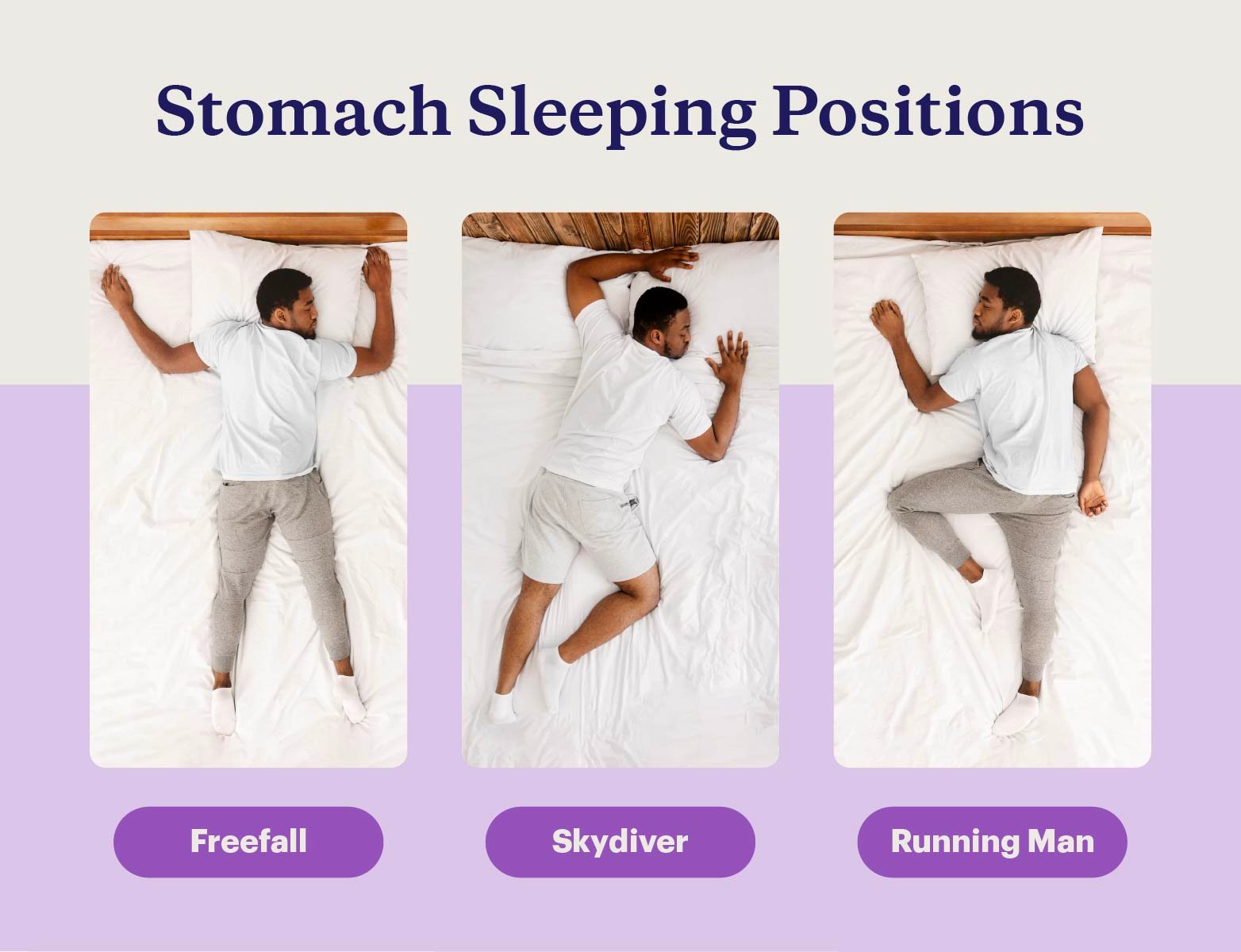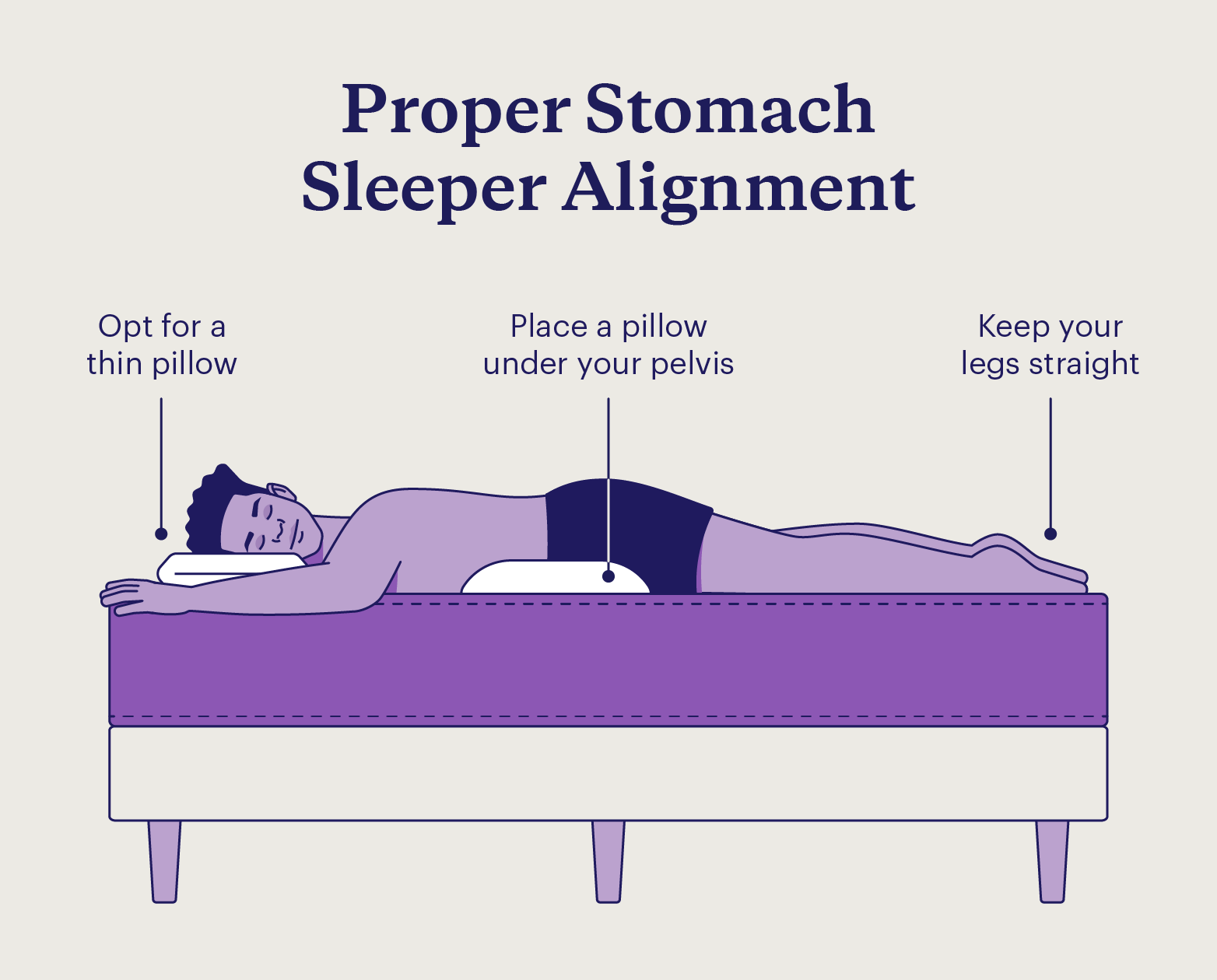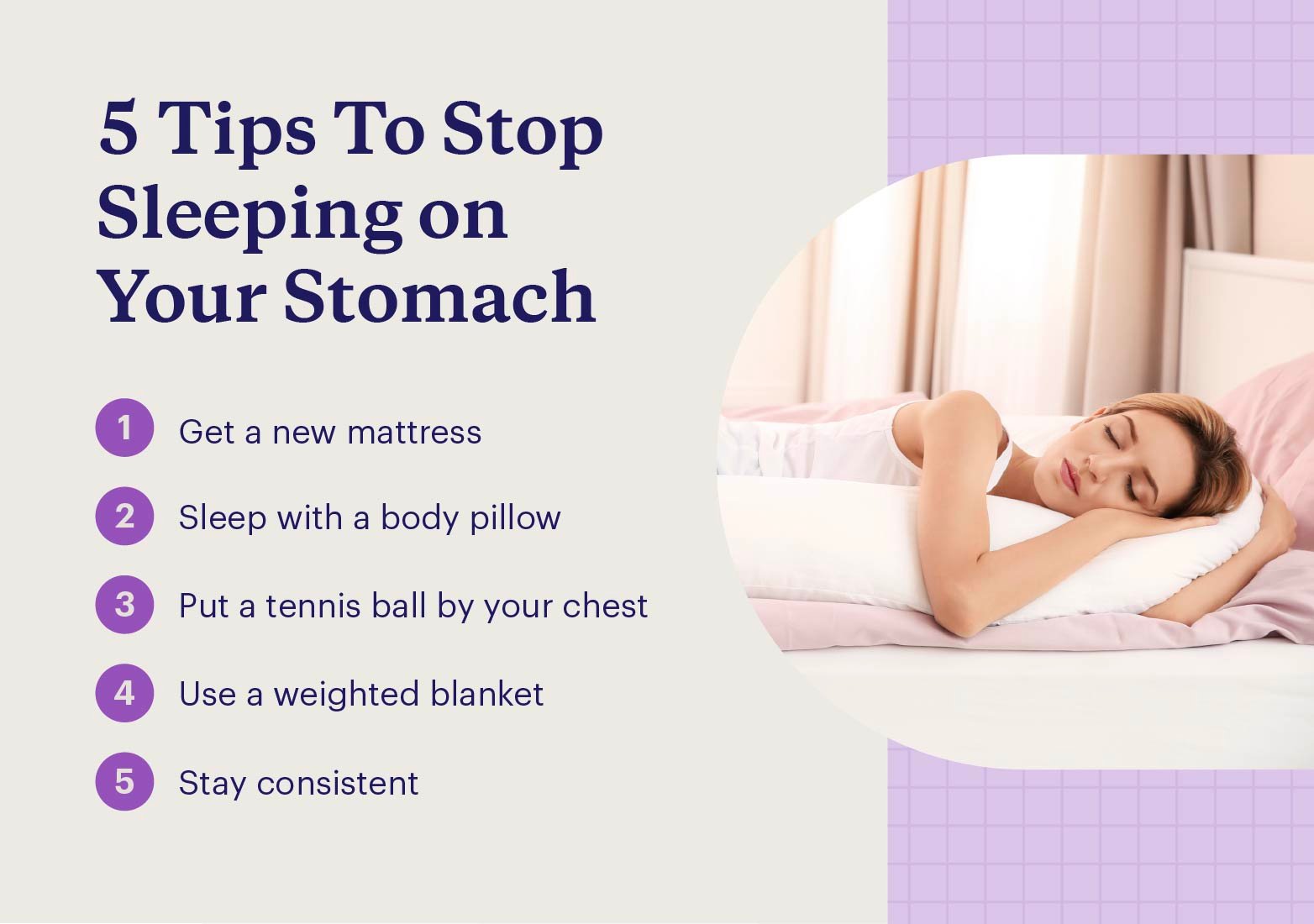
Stomach Sleeper Guide: Is It Wrong? (+ How To Do It Right)
Key Takeaways:
- Stomach sleepers can experience neck and back pain due to spinal misalignment.
- See our recommendations for the best mattress and pillows for stomach sleepers.
Unless you’ve trained yourself to sleep in a certain position, most people do choose their sleep position – it is an innate reaction to how you experience comfort. Most of us are side and back sleepers with only 7% of people being stomach sleepers1. While less common, stomach sleeping is important to discuss to provide these types of sleepers with tips and tricks for getting proper support and alignment every night.
Many people who sleep on their stomachs experience neck and back pain due to spinal misalignment. With the help of a quality mattress, a proper pillow, and other quick fixes, these issues can be lessened if not completely solved.
With nearly 25 years of experience as a sleep doctor, lecturer, and author, Michael Breus, Ph.D., is the sleep expert Purple depends on to build out this guide. Keep reading to learn about the potential problems of sleeping on your stomach, tips on how to make stomach sleeping more comfortable, and how to choose a mattress and pillow for this sleeping position.
Common Stomach Sleeping Positions
Stomach sleeping extends beyond simply lying face down — positional nuances vary from person to person. Here’s a guide to better optimize your comfort and spinal alignment based on which specific stomach sleeper position fits you best.
Freefall
The freefall sleeping position is characterized by lying face down with your arms extended forward and your head turned to one side. In this position, the sleeper’s stomach is in direct contact with the mattress and the legs are typically straight or slightly bent. Freefall sleepers also often have their hands underneath or near their pillow, creating a freefall or floating feeling.
Skydiver
Similarly, skydivers sleep on their stomach with one leg raised and arms positioned near their head or around their pillow. It also mimics the feeling of being suspended in the air. However, this position puts extra strain on the neck and back.
Running Man
As the name suggests, the running man resembles the posture of a runner mid-stride. The sleeper lies on their stomach with one leg straightened with the other crossed over. One arm is straight at the side while the other is bent up at the elbow.
How To Sleep on Your Stomach Properly: 6 Tips
If sleeping on your stomach is the only comfortable position for you, here are six tips to enhance your spinal alignment. While these suggestions may not completely fix any issues associated with stomach sleeping, they can help alleviate some of the aches or discomfort you might experience.
1. Sleep With a Thin or Moldable Pillow
Finding the right pillow height can help keep your head and neck from too high of elevation that causes misalignment of your spine. Try using a low-loft pillow or no pillow at all. Alternatively, you could use a moldable pillow that lets you adjust to your preferred loft for personalized support.
2. Sleep With a Pillow Under Your Pelvis
Placing a pillow under your pelvis will add support for your lower back and ensure your spine stays in a more neutral position. This can help minimize any lower back pain you may experience as a result of sleeping on your stomach.
3. Sleep on a Mattress That Supports Spinal Alignment
The right mattress firmness can help support your spinal alignment. A medium to firm level of support will effectively alleviate pressure points, especially around the hips, during sleep. Additionally, any mattress designed for back pain that helps prevent excessive sinking could be beneficial for a stomach sleeper. However, for women, a soft or medium mattress is beneficial for overall comfort.
4. Sleep With Your Legs Straight
Maintain alignment in your hips by trying to keep your legs straight while you sleep. It’s common for stomach sleepers to bend or cross one leg, potentially causing hip pain from misalignment. Instead, try hanging your feet off the end of the bend, pointed downward, to help keep your hips straight throughout the night.
5. Align Your Body Before Falling Asleep
Practice aligning your neck, spine, hips, and legs before drifting off to sleep. This habit may help you from contorting into funky positions sleeping positions when on your stomach. It can also help minimize the likelihood of tossing and turning into an uncomfortable position.
6. Stretch Daily
Establish a morning and nightly routine of stretching to help ease tension in your lower and upper back since sleeping in a rigid position can cause stiffness. Stretching can also help prevent soreness in your neck since many stomach sleepers tend to sleep with their heads turned to the side.
Is Sleeping on Your Stomach Bad?
Boiling down the answer to a simple yes or no is impossible, however, sleeping on your stomach is generally not recommended. While it’s not necessarily dangerous, studies have shown that this sleeping position increases spinal pain2, as it causes an unnatural curvature of the spine. This can lead to strain on your neck, back, and even shoulders.
The comfort and alignment of this position varies from person to person. There are a few benefits like a reduction in snoring and sleep apnea symptoms and even improved digestive comfort for those prone to acid reflux or heartburn. Keep in mind that sleeping on your side (specifically your left side3 for those who suffer from acid reflux) can have the same benefits without the same risk of neck and back pain.
Some individuals should especially avoid stomach sleeping, including:
- Individuals with chronic neck or back pain
- Pregnant women, especially in the later stages of pregnancy
- People with respiratory issues, as stomach sleeping may affect breathing
- Those with certain medical conditions like herniated discs or degenerative disc disease
| Pros | Cons |
|---|---|
| Prevents snoring | Potential neck, back, and/or shoulder pain |
| Reduces some sleep apnea symptoms | Spinal misalignment due to head extension |
| Decreases acid reflux symptoms | Increased appearance of facial wrinkles |
| May cause numbness or stiffness if arms are placed under your torso or above your head |
What Happens When You Sleep on Your Stomach
When you sleep on your stomach, several physiological effects occur. This sleep position often leads to an unnatural curve in the spine, potentially causing strain on the neck and back. The head is also usually turned to one side, which comes with additional side effects. Here’s how sleeping on your stomach may affect your body.
Spinal Misalignment and Pain
If your mattress doesn’t offer the right amount of support, the weight of sleeping on your stomach causes your torso to sink into the mattress. This sinking effect can result in an arching of your back, causing your spine to deviate from its neutral alignment.
When your spine isn’t properly aligned, it can put stress on your back and neck4. That strain leads to aches and pains when you wake up.
Facial Breakouts
The continuous pressure of your face against your pillow or mattress while sleeping on your stomach increases the transfer of oils, sweat, and bacteria between your face and your pillow or sheets. This contact can clog your pores, leading to breakouts or exacerbation of existing skin conditions. Washing your sheets more often can help mitigate this issue.
Can You Sleep on Your Stomach While Pregnant?
Some people find sleeping on their stomachs in their first trimester of pregnancy comfortable. However, as your stomach grows, sleeping on your stomach becomes more difficult and may even cause sleep deprivation5, which isn’t healthy for you or your baby.
To sleep better when pregnant, try sleeping on your left side. This alleviates pressure, encourages better blood circulation, and reduces acid reflux.
How To Stop Sleeping on Your Stomach
Establishing a new sleep position requires time and patience, but there are preferable alternatives to stomach sleeping. As you prioritize finding a better position, you’ll gradually notice the positive benefits. Here are some tips to aid the transition and help you fall asleep fast.
1. Get a New Mattress
A common response to an uncomfortable mattress is to resort to sleeping on your stomach. If you’re finding your mattress less than ideal, consider investing in a quality option that will improve your overall sleeping experience. A hybrid mattress, which combines foam comfort layers and a coil system can offer targeted support and cooling benefits.
2. Sleep With a Body Pillow
Holding a body pillow between your arms and legs can encourage a more comfortable side sleeping position. It will also provide additional support, helping you maintain the position instead of rolling over onto your stomach during the night.
Don’t have the proper pillow size? Try sleeping with a pillow between your knees.
3. Try the Tennis Ball Trick
If you want to overcome your stomach sleeping habit, introduce discomfort as a deterrent. Place a tennis ball in your pajama pocket or position it at chest level to discourage yourself from rolling onto your stomach.
4. Use a Weighted Blanket
Incorporating a weighted blanket can also help you transition away from a stomach sleeping position. One benefit of a weighted blanket is a sense of security and comfort, potentially easing the discomfort associated with abandoning a habitual sleeping position. The gentle pressure can also help prevent tossing and turning and keep you in your new position during the night.
5. Stay Consistent
Experts say it can take 18 to 254 days6 to break a habit. That may seem like an intimidating range, but, like breaking any bad habit, you'll need to put in persistent effort. The key lies in consistency — the more steadfast you are in adopting better sleeping habits, the quicker the transition and improvement in your sleep quality will happen.
Best Mattresses for Stomach Sleepers
Enhancing the comfort of stomach sleeping begins with picking out the right mattress. The right stomach sleeper mattress will provide excellent support to keep your body aligned while sleeping. Here are some Purple mattress differences with benefits for stomach sleepers:
- The Purple Mattress®: With 2-inches of GelFlex® Grid, comfort foam, and supportive foam base, the original Purple Mattress® has everything a stomach sleeper needs to stay supported and aligned throughout the night.
- Purple Restore Hybrid Collection: Any of Purple’s hybrid mattresses from the Restore Hybrid Collection is a great choice for stomach sleepers due to the combination of the innovative GelFlex® Grid, Edge-to-Edge Coils, and Ultra Comfort Foam layers. Opt for the firm option for adequate support.
- Purple Rejuvenate™ Mattress: For top-of-the-line alignment and core support, the Purple Rejuvenate™ Mattress is fitted with revolutionary DreamLayer™ technology, which offers decadently plush surface comfort and enhanced temperature bliss. The mattress also includes a 2” GelFlex® Grid, active response foam, and responsive coils to help you sleep in any position.
“As a stomach sleeper myself, I can tell you that having the right mattress-pillow combination is critical to waking up feeling refreshed and ready to meet the day!” — Dr. Michael Breus, sleep expert
Best Pillows for Stomach Sleepers
Knowing how to choose a pillow can also help you sleep more comfortably on your stomach. Many stomach sleepers prefer a lower-loft pillow, but it ultimately comes down to personal preference. Here is a Purple pillow comparison of what we recommend for this sleeping position:
- Purple DreamLayer™ Pillow: Enjoy the conforming feel of memory foam without the heat or response delay with the Purple DreamLayer™ Pillow. It’s designed with MicroAir™ Foam and GelFlex® Grid for a medium-soft feel that molds to your head and neck, with two Booster layers that you can add or remove to reach your ideal height.
- Purple Freeform™ Pillow: Made with MicroFlex™ Moon Foam and a 360-degree wrap of GelFlex® Grid, the Purple Freeform™ Pillow is a shapeable pillow that allows you to add or remove filling to adjust the pillow’s height and firmness to your liking.
- Purple Harmony™ Pillow: The Purple Harmony™ Pillow has a 360-degree wrap of temperature-balancing honeycomb GelFlex® Grid surrounding a ventilated Talalay latex core. This combination keeps you cool all night long and creates a weightless, floating feel that stomach sleepers often enjoy.
Why Do I Prefer To Sleep on My Stomach?
Sleeping on your stomach is a personal preference influenced by comfort and habit. You may find that the sleep position provides a sense of security, especially if it’s a habit you’ve had for many years. It’s important to be mindful that while this position may be comfortable in the short term, it could potentially cause negative effects in the long term.
FAQ
We don’t recommend sleeping on your stomach. Stomach sleeping can cause back, neck, and joint pain compared to side and back sleepers. If you do choose to sleep on your stomach, make sure to sleep with either no pillow or a thin pillow, and use a mattress that supports proper spinal alignment.
Side effects of sleeping on your stomach include strain on your neck and spine. This spinal misalignment can cause increased pressure on your joints, potentially causing stiffness and discomfort. Over time, sleeping on your stomach can cause chronic neck or back pain. Additionally, this position may impact your breathing, as the head is often turned to the side, potentially affecting your airway.
A stomach sleeper is a person who prefers lying face down during the night. In this position, the torso, stomach, and chest have direct contact with the mattress, while the head is turned to one side or the forehead rests on the pillow.
Roughly 7% of people are stomach sleepers, making it a fairly rare position. The majority of people prefer to sleep on their side, followed by back sleepers.
The choice to bend one leg while sleeping on your stomach may be an unconscious attempt for additional comfort or to alleviate pressure on certain areas of the body. Overall, people adopt sleeping positions based on what feels most natural and relaxing to them.
More To Explore
Level up your sleep routine with our most-loved products.
















